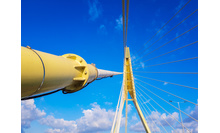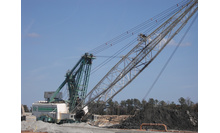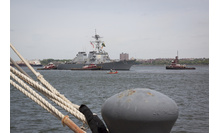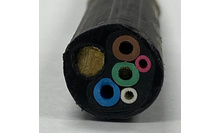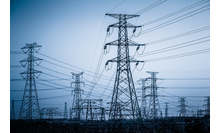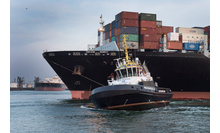Phillystran High Performance Tower Guys (HPTG-I) are made from stranded aramid fibers with up to 1.7 million pounds breaking strength. They eliminate transmission problems associated with EHS (extra high strength) and bridge strand steel wire guying, such as Electro Magnetic Interference (EMI), Radio Frequency Interference (RFI), Signal Suppression Array Directional Irregularities Zapping and White-Noise Arcing.
What is a “guying system?”
Phillystran’s HPTG-I aramid fiber guy lines are one component of the HPTG-I guying system. By offering a system, the user is assured that all details related to the HPTG-I guy line have been addressed. This is the unique factor which differentiates these products from other steel guy alternatives.
1st component is the HPTG-I aramid fiber guyline
- Made from high modulus (not standard modulus) aramid fibers such as Kevlar and Twaron® fibers
- Designed/constructed in a unique wire-lay construction
- Resin impregnated for enhanced performance
- Protected with a thick polyurethane extrusion for maximum UV and environmental resistance and offering the longest life expectancy of any non-metallic guyline on the market
2nd component is the factory installed corona sockets
- HPTG-I aramid fiber guylines are supplied as guy assemblies fabricated to customer length specifications
- Corona sockets are included to protect the guyline from RF burning
- Suggested for all towers/antennas operating at powers of 10KW and above 3rd component is the optional SVD or AFS vibration dampers
4th component is factory/engineering assistance for tensioning and installation guidelines and suggestions
5th component is the steel tail which is a design consideration recommended for all tower installations (actual steel tail materials not supplied by Phillystran).
Each of these components are described in more detail throughout the broadcasting product brochure.
How to determine what size HPTG-I is required
A certified structural engineer should be consulted to determine guy size.
- Total Guying, where the HPTG-I assembly is greater than 50% of the total guy length: select the HPTG-I size equal to the EHS steel guy size (recommended by either a structural engineer or tower manufacturer) based on RBS or refer to table in brochure.
- Partial Guying, where the HPTG-I assembly is 50% or less of the total guy length: Partial guys of HPTG-I should not be less than 10% of the tower height (at the HPTG-I assembly attaching point) in length and should extend equally in all directions at a given guy level. Example is a 3-sided 1,000 ft. FM tower with 3 top level HPTG-I assemblies not less than 100 ft. in length. Refer to table in the broadcasting brochure.
What is the purpose of the HPTG-I jacket?
The aramid fiber guy line core must be protected from the harmful effects of ultraviolet (UV) radiation. The HPTG-I thick extruded jacket is a co-polymer polyurethane with excellent weathering and dielectric properties, blended with carbon black pigmentation for maximum UV resistance. The outer jacket sheds moisture thus assuring consistent dielectric properties regardless of the season or climate.
What is the function of the steel tail?
A steel tail is a length of EHS steel guy line connecting the HPTG-I assemblies to the turnbuckle or guy anchor. The steel tail protects the HPTG-I assemblies from damage due to brush fires, lawn maintenance equipment or vandals. The steel tail length should be sufficient to get the bottom end of the HPTG-I assembly above arm reach, or above brush tops (if located in a marsh or tall brush area). The HPTG-I should never pass through tree limbs or be allowed to rub against poles or trees. The steel tail allows for easier guy length calculations and serves as a guy tension monitoring point, as well as a safer area to attach guy grips during guy line installation and tensioning.
Grounding of tower and anchors
Grounding will decrease the chances of damage to the HPTG-I caused by RF flashover or lightning. Improper grounding can expose the guy system to damage at both the tower attaching point, as well as at the bottom end connection (where the HPTG-I attaches to the steel tail). Most electrical and broadcasting consultants can advise on proper grounding techniques.
What is the life expectancy of HPTG-I?
HPTG-I differs from other non-metallic guy lines or rods because of the thick protective outer polyurethane extruded jacket (see table 3) which protects the HPTG-I for many years. Phillystran guy line systems have been in place since the early 1970s, with an expected life of 25 years or more; perhaps the life of the tower(s). Retirement criteria is based on the condition of the jacket, especially near the base of the corona socket. It is recommended that HPTG-I guy systems be inspected at least annually, and more frequently as the guy system ages.
